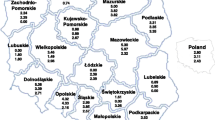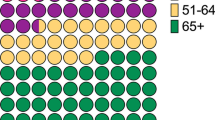Abstract
Purpose
The aim of this study was to describe the clinical and microbiological characteristics of recurrent invasive pneumococcal disease (RIPD) cases identified in the Region of Madrid between January 2007 and December 2011.
Methods
Streptococcus pneumoniae serotyping was performed by Pneumotest-Latex and Quellung reaction. Molecular typing was carried out by pulsed-field gel electrophoresis (PFGE). A relapse was defined as any case of RIPD caused by strains with similar PFGE profile. Re-infections were defined by detection of recurrent episodes caused by strains with different PFGE patterns.
Results
During the study period, 2,929 S. pneumoniae strains isolated from 2,858 patients with invasive pneumococcal disease (IPD) were studied. In 61 patients (2.1 %), 132 episodes of RIPD were detected (two episodes in 52 patients, three in 8 and four in 1). Twelve patients had relapses, 47 had re-infections and two had re-infections followed by relapses. Common risk factors to developing RIPD were HIV (42.6 %) and haematological malignancies (16.4 %). The most frequent serotypes were 8 (16 episodes) and 19A (15 episodes). Fourteen strains that were resistant to levofloxacin were also resistant to erythromycin. The proportion of strains co-resistant to erythromycin and levofloxacin was significantly higher in relapses (11/29) than in re-infections (3/103).
Conclusions
The occurrence of repeated episodes of IPD in the same patient over the time is not an exceptional issue. Some underlying conditions that may favour these recurrences, mainly immunosuppression, need to be considered in patients having an episode of IPD.
Similar content being viewed by others
References
Leibovitz E. Complicated otitis media and its implications. Vaccine. 2008;26:G16–9.
Fenoll A, Granizo JJ, Aguilar L, Giménez MJ, Aragoneses-Fenoll L, Hanquet G, et al. Temporal trends of invasive Streptococcus pneumoniae serotypes and antimicrobial resistance patterns in Spain from 1979 to 2007. J Clin Microbiol. 2009;47:1012–20.
Mufson MA, Hao JB, Stanek RJ, Norton NB. Clinical features of patients with recurrent invasive Streptococcus pneumoniae disease. Am J Med Sci. 2012;343:303–9.
Mason EO Jr, Wald ER, Tan TQ, Schutze GE, Bradley JS, Barson WJ, et al. Recurrent systemic pneumococcal disease in children. Pediatr Infect Dis J. 2007;26:480–4.
Matsubara K, Fukaya T, Ubukata K, Chen M, Nigami H, Harigaya H, et al. Recurrence of occult pneumococcal bacteremia by an identical strain in an apparently healthy child. J Infect. 2007;54:e87–90.
Rodríguez-Avial I, Ramos B, Ríos E, Cercenado E, Ordobás M, Sanz JC, on behalf of the Madrid Streptococcus pneumoniae Microbiological Group (MSPSG). Clonal spread of levofloxacin-resistant Streptococcus pneumoniae invasive isolates in Madrid, Spain (2007–2009). Antimicrob Agents Chemother. 2011;55:2469–71.
Sanz JC, Cercenado E, Marín M, Ramos B, Ardanuy C, Rodríguez-Avial I, et al. Multidrug-resistant pneumococci (serotype 8) causing invasive disease in HIV + patients. Clin Microbiol Infect. 2011;17:1094–8.
CLSI performance standards for antimicrobial susceptibility testing; eighteenth informational supplement. CLSI document M100-S18. Wayne: Clinical and Laboratory Standards Institute; 2008.
Clinical and Laboratory Standard Institute (CLSI). Performance standards for antimicrobial susceptibility testing; seventeenth informational supplement. CLSI document M100-S17. Wayne: Clinical and Laboratory Standards Institute; 2007.
McEllistrem MC, Stout JE, Harrison IH. Simplified protocol for pulsed-field gel electrophoresis analysis of Streptococcus pneumoniae. J Clin Microbiol. 2000;38:351–3.
Tenover FC, Arbeit RD, Goering RV, Mickelsen PA, Murray BE, Persing DH, et al. Interpreting chromosomal DNA restriction patterns produced by pulsed-field gel electrophoresis: criteria for bacterial strains typing. J Clin Microbiol. 1995;33:2233–9.
King MD, Whitney CG, Parekh F, Farley MM. Active bacterial core surveillance team/emerging infections program network. Recurrent invasive pneumococcal disease: a population-based assessment. Clin Infect Dis. 2003;37:1029–36.
Einarsdóttir HM, Erlendsdóttir H, Kristinsson KG, Gottfredsson M. Nationwide study of recurrent invasive pneumococcal infections in a population with a low prevalence of human immunodeficiency virus infection. Clin Microbiol Infect. 2005;11:744–9.
Antonio M, Oluwalana C, Secka O, Corrah T, Howie S, Adegbola RA. Exogenous re-infection by a novel Streptococcus pneumoniae serotype 14 as a cause of recurrent meningitis in a child from the Gambia. Ann Clin Microbiol Antimicrob. 2009;8:3.
Bogaert D, De Groot R, Hermans PW. Streptococcus pneumoniae colonisation: the key to pneumococcal disease. Lancet Infect Dis. 2004;4:144–54.
Rodríguez-Créixems M, Muñoz P, Miranda E, Peláez T, Alonso R, Bouza E. Recurrent pneumococcal bacteremia. A warning of immunodeficiency. Arch Intern Med. 1996;156:1429–34.
Font B, Llimiñana C, Fontanals D, Pineda V, Segura F. Eleven-year study of recurrent pneumococcal bacteremia. Eur J Clin Microbiol Infect Dis. 2001;20:636–8.
van Driel JJ, Bekker V, Spanjaard L, van der Ende A, Kuijpers TW. Epidemiologic and microbiologic characteristics of recurrent bacterial and fungal meningitis in the Netherlands, 1988–2005. Clin Infect Dis. 2008;47:e42–51.
Plevneshi A, Svoboda T, Armstrong I, Tyrrell GJ, Miranda A, Green K, et al. Toronto invasive bacterial diseases network. Population-based surveillance for invasive pneumococcal disease in homeless adults in Toronto. PLoS One. 2009;4:e7255.
Orlicek SL, Herrod HG, Leggiadro RJ, Luedtke G, English BK. Repeated invasive pneumococcal infections in young children without apparent underlying immunodeficiency. J Pediatr. 1997;130:284–8.
Maugein J, Guillemot D, Dupont MJ, Fosse T, Laurans G, Roussel-Delvallez M, et al. Clinical and microbiological epidemiology of Streptococcus pneumoniae bacteremia in eight French counties. Clin Microbiol Infect. 2003;9:280–8.
Porat N, Arguedas A, Spratt BG, Trefler R, Brilla E, Loaiza C, et al. Emergence of penicillin-nonsusceptible Streptococcus pneumoniae clones expressing serotypes not present in the antipneumococcal conjugate vaccine. J Infect Dis. 2004;190:2154–61.
Hunt Gerardo S, Citron DM, Goldstein EJ. PCR fingerprinting analysis for differentiation of Streptococcus pneumoniae reinfection versus relapse. Diagn Microbiol Infect Dis. 2000;36:275–8.
Gutierrez Rodríguez MA, Varela González A, Ordobás Gavín MA, Martín Martínez F, García Marína N, Ramos Blázquez B, et al. Invasive pneumococcal disease: association between serotype, clinical presentation and lethality. Vaccine. 2011;29:5740–6.
Ardanuy C, Rolo D, Fenoll A, Tarrago D, Calatayud L, Liñares J. Emergence of a multidrug-resistant clone (ST320) among invasive serotype 19A pneumococci in Spain. J Antimicrob Chemother. 2009;64:507–10.
Ritchie ND, Mitchell TJ, Evans TJ. What is different about serotype 1 pneumococci? Future Microbiol. 2012;7:33–46.
Munier AL, de Lastours V, Varon E, Donay JL, Porcher R, Molina JM. Invasive pneumococcal disease in HIV-infected adults in France from 2000 to 2011: antimicrobial susceptibility and implication of serotypes for vaccination. Infection. 2013;41:663–8.
Isea-Peña MC, Sanz-Moreno JC, Esteban J, Fernández-Roblas R, Fernández-Guerrero ML. Risk factors and clinical significance of invasive infections caused by levofloxacin-resistant Streptococcus pneumoniae. Infection. 2013;41:935–9.
Kang CI, Song JH, Kim SH, Chung DR, Peck KR, Thamlikitkul V, et al. Association of levofloxacin resistance with mortality in adult patients with invasive pneumococcal diseases: a post hoc analysis of a prospective cohort. Infection. 2013;41:151–7.
Centers for Disease Control and Prevention (CDC). Licensure of 13-valent pneumococcal conjugate vaccine for adults aged 50 years and older. MMWR. 2012;61:394–5.
Vila-Corcoles A, Ochoa-Gondar O, Guzman-Avalos A, Gomez-Bertomeu F, Figuerola-Massana E, Raga-Luria X, et al. Incidence of pneumococcal infections among children under 15 years in southern Catalonia throughout the heptavalent conjugate vaccine era, 2002–2009. Infection. 2013;41:439–46.
Schutze GE, Tucker NC, Mason EO Jr. Failure of the conjugate pneumococcal vaccine to prevent recurrent bacteremia in a child with human immunodeficiency virus disease. Pediatr Infect Dis J. 2001;20:1009–10.
Nunes MC, Madhi SA. Safety, immunogenicity and efficacy of pneumococcal conjugate vaccine in HIV-infected individuals. Hum Vaccin Immunother. 2012;8:1–13.
American Academy of Pediatrics Committee on Infectious Diseases. Recommendations for the prevention of Streptococcus pneumoniae infections in infants and children: use of 13-valent pneumococcal conjugate vaccine (PCV13) and pneumococcal polysaccharide vaccine (PPSV23). Pediatrics. 2010;126:186–90.
Picazo JJ, González-Romo F, García Rojas A, Pérez-Trallero E, Gil Gregorio P, de la Cámara R, et al. Consenso sobre la vacunación anti-neumocócica en el adulto con patología de base. Rev Esp Quimioter. 2013;26:232–52.
Conflict of interest
Juan Carlos Sanz has received assistance from Pfizer for attending to scientific meetings. The others authors declare that they have no conflict of interest.
Author information
Authors and Affiliations
Corresponding author
Additional information
On behalf of the Madrid Streptococcus pneumoniae Microbiological Study Group.
A list of members of the Madrid Streptococcus pneumoniae Microbiological Study Group is given in Appendix.
Appendix
Appendix
Contributing members of the Madrid Streptococcus pneumoniae Microbiological Study Group are: Mercedes Marín (Hospital General Universitario Gregorio Marañón); Francisca Sanz, Fernando Chaves, Maria Angeles Orellana (Hospital Universitario 12 de Octubre); Elia Gómez, Elena Loza, María Antonia Meseguer (Hospital Universitario Ramón y Cajal); Fernando González-Romo, Esther Culebras (Hospital Clínico San Carlos); Juana Cacho (Hospital Universitario de Getafe); Beatriz Orden, Isabel Sanchez (Hospital Universitario Puerta de Hierro Majadahonda); María del Carmen de las Cuevas, Ana Correa, Diego Domingo, Buenaventura Buendía (Hospital Universitario de La Princesa); Isabel Wilhelmi (Hospital Universitario Severo Ochoa); Maria Pilar Romero, Adela García-Perea (Hospital Universitario La Paz); Alberto Delgado, José Valverde (Hospital Universitario Fundación Alcorcón); Peña Gómez-Herrúz (Hospital Universitario Príncipe de Asturias); Ricardo Fernández Roblas, María Carolina Isea Peña (Fundación Jiménez Díaz); Belén Hernández-Milán (Hospital Infantil Universitario Niño Jesús); Jose Luis Gómez Garcés (Hospital Universitario de Móstoles); Santiago Salso (Hospital Universitario Madrid Montepríncipe); Elena García-Peñuela (Hospital Sanitas La Zarzuela); Dolores Martín (Hospital Infanta Cristina); Paula Fernández, Diana Monclús (Hospital San Rafael); Maria Jose Uría (Hospital del Sureste); Andrea González Prieto (Hospital del Tajo); Almudena Alhambra, (Hospital Universitario Madrid y Madrid Torrelodones), Carmen Gómez (Madrid Sanchinarro); Aída Sanchez-García, Elena Sáez (Hospital Infanta Sofía); Luis Ruiz Velasco (Hospital Moncloa); Luisa García-Picazo (Hospital El Escorial); Carolina Camplelo (Hospital Infanta Leonor); Laura Molina, Isabel García-Arata (Hospital de Fuenlabrada); Mercedes Martínez-Arroyo (Hospital Sanitas La Moraleja); Esteban Aznar (Hospital del Henares); Mari-Fran Ramos (Hospital Central de la Defensa Gómez Ulla); Ana Enríquez (Hospital Carlos III); Amparo Catón (Sanatorio Nuestra Señora del Rosario); Isabel Jiménez (Clínica Fuensanta); Laura Navas, Pilar Sanchez de la Blanca (Hospital Los Madroños), Firdaus El Knaichi (Hospital de Torrejón). We thank Marisa Fernández, Nieves Herranz and Mariluz Alvarez for their excellent technical assistance.
Rights and permissions
About this article
Cite this article
Sanz, J.C., Rodríguez-Avial, I., Ríos, E. et al. Recurrent pneumococcal invasive disease in the Region of Madrid during a five-year period. Infection 42, 475–483 (2014). https://doi.org/10.1007/s15010-013-0571-3
Received:
Accepted:
Published:
Issue Date:
DOI: https://doi.org/10.1007/s15010-013-0571-3




